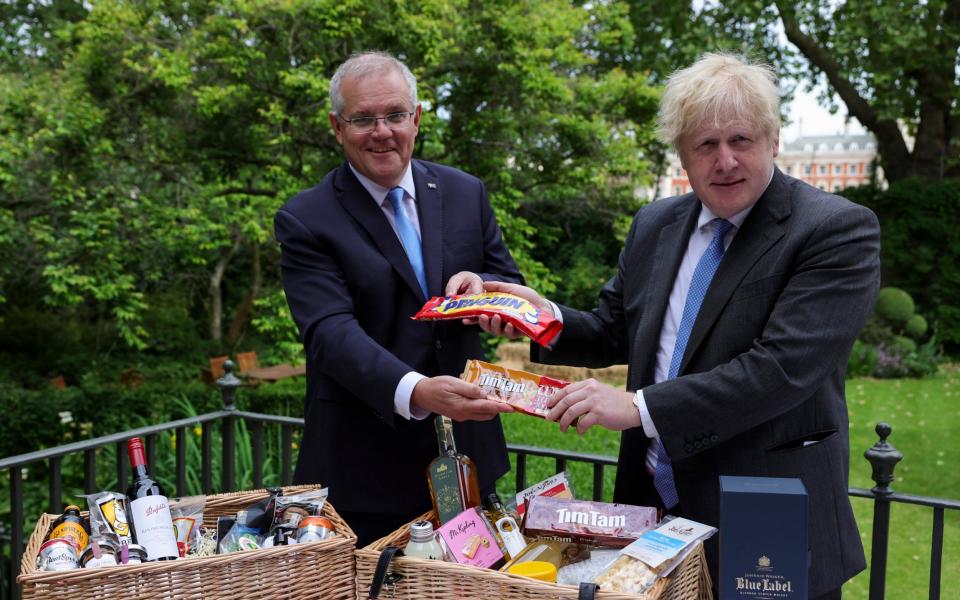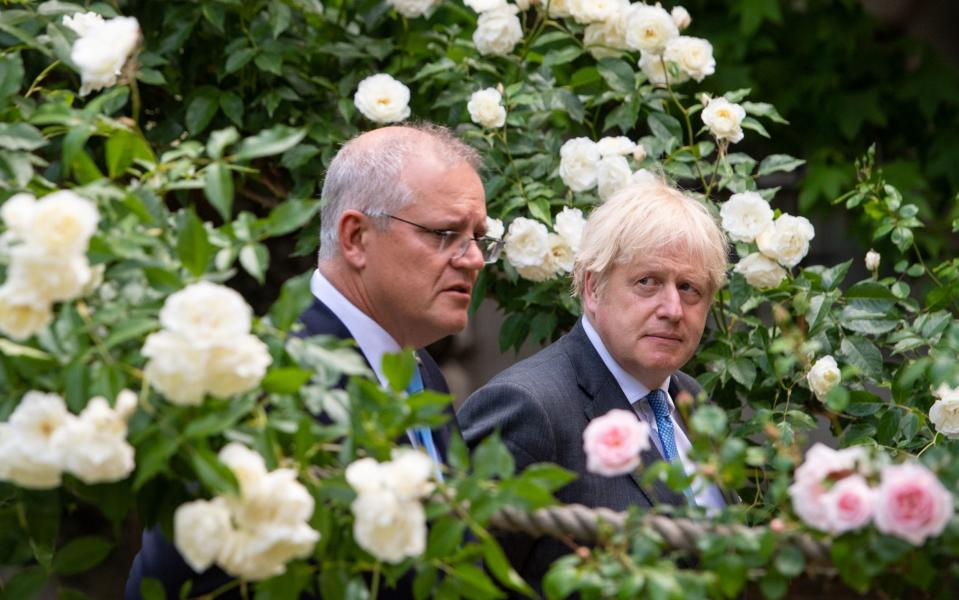Britain and Australia agree free trade deal

Britain and Australia have agreed a trade deal - the first negotiated from scratch post-Brexit.
The UK-Australia free trade deal, which has been agreed by Prime Minister Boris Johnson and his counterpart, Scott Morrison, means British products such as cars, Scotch whisky, biscuits and ceramics will be cheaper to sell to Australia, Downing Street said.
In a statement, Mr Johnson said: "Today marks a new dawn in the UK's relationship with Australia, underpinned by our shared history and common values.
"Our new free trade agreement opens fantastic opportunities for British businesses and consumers, as well as young people wanting the chance to work and live on the other side of the world.
"This is global Britain at its best - looking outwards and striking deals that deepen our alliances and help ensure every part of the country builds back better from the pandemic."

The new deal will help distillers by removing tariffs of up to 5pc on Scotch whisky, according to a Downing Street statement stressing the benefits of the deal to the whole UK.
It said more than 450 businesses in Wales exported to Australia last year and that "life science companies and chemicals manufacturers are set to benefit in particular".
For Northern Ireland, it said "90pc of all exports from Northern Ireland to Australia are machinery and manufacturing goods - used extensively in Australia's mining, quarrying and recycling sectors. Under the new FTA tariffs will be removed and customs procedures will be simplified".
And car manufacturers in the Midlands and North of England will see tariffs of up to 5pc cut, it added.
Reaching the first post-Brexit trade deal
After talks between their prime ministers ironed out outstanding issues, Australia's minister for trade Dan Tehan confirmed on Tuesday an agreement had been met.
Britain had made securing a trade deal with Australia a priority for its post-Brexit strategy as it seeks to build stronger commercial and diplomatic links in the Indo-Pacific region, but negotiations have dragged on for months.
Australia's Prime Minister Scott Morrison and Boris Johnson overcame sticking points during a bilateral talks after the G7 meeting in Britain over the weekend, which Mr Morrison had attended as a guest.
"Both prime ministers have held a positive meeting in London overnight and have resolved outstanding issues in relation to the [Free Trade Agreement],” Mr Tehan said in a statement.
The leaders were said to have agreed the pact over dinner in Downing Street on Monday.
The UK Government has estimated the positive impact of the deal on Australia's gross domestic product - the total value of goods produced and services provided in a country during one year - as being somewhere between 0.01pc and 0.06pc.
Reaction to the agreement
The Australian Broadcasting Corporation reported Australian Trade Minister Dan Tehan, who held talks in London earlier this year with International Trade Secretary Liz Truss, calling the pact a "win for jobs, businesses, free trade and highlights what two liberal democracies can achieve while working together".
Australian British Chamber of Commerce chief executive officer David McCredie tweeted that the deal would create "many great opportunities for trade, investment and collaboration".
But industry leaders have raised concerns over possible compromises on food standards, while farmers fear they could be undercut by cut-price imports.
A split in the Cabinet also appeared between Ms Truss and Environment Secretary George Eustice, who has concerns about the impact on farmers.
Cabinet Office minister Michael Gove, meanwhile, harbours fears that a deal could fuel demands for Scottish and Welsh independence.
But former Australian prime minister Tony Abbott, who sits on the UK Board of Trade, told GB News he is confused "that so many people in Britain are always running the country down".

"Britain can cope. And a trade deal with one of Britain's friends... that's no threat to the people of Britain, this is going to help the people of Britain," Mr Abbott added.
The deal will be keenly scrutinised by British farmers, who fear they could be forced out of business if the deal eliminates tariffs on lamb and beef imports from Australia.
Though details have still to emerge, official estimates say the agreement could add £500m ($705.7m) to British economic output over the long term.
For Australia, however, analysts questioned the importance for an economy already focused on Asia.
"This free trade agreement is more about symbolism than immediately tangible material benefits," said Ben Wellings, senior lecturer in politics and international relations at Monash University.
Cabinet Office Minister Michael Gove said that how Australian farmers operated had been "mischaracterised" during the discussion around the trade deal.
"Australia is a friend and ally," he told Sky News.
"I think that there have been one or two points that have been made about Australia during the course of this debate that mischaracterise how Australian farmers operate and the opportunities also for UK farmers.
"So it's important that we maintain protections and support for farmers, but it's also the case that opening up trade barriers, bringing them down and opening up the opportunities, provides our farmers with the chance to show on the world stage the amazing quality of UK produce."

 money
money 